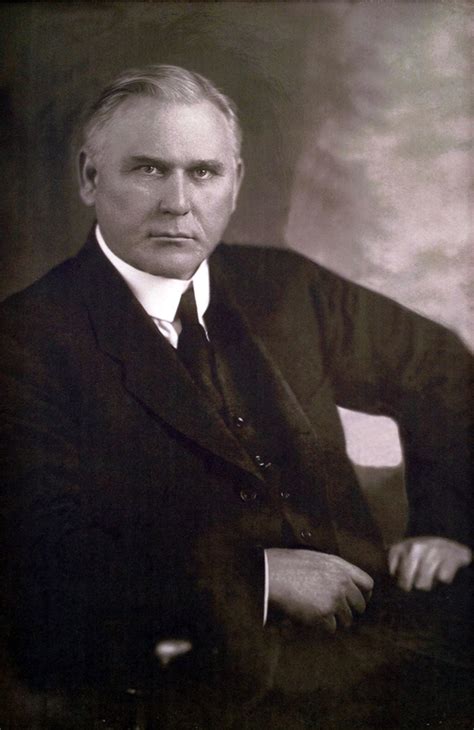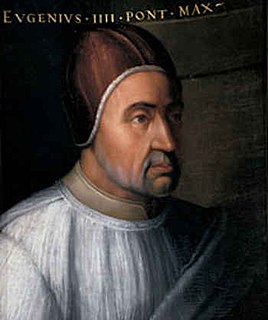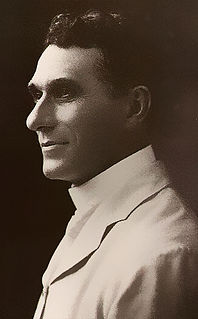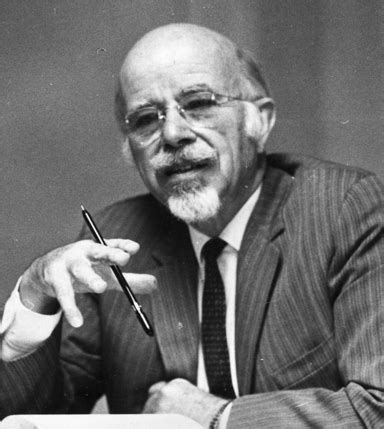A Quote by Edward Gibbon
But this inestimable privilege was soon violated: with the knowledge of truth the emperor imbibed the maxims of persecution; and the sects which dissented from the catholic church were afflicted and oppressed by the triumph of Christianity. Constantine easily believed that the heretics, who presumed to dispute his opinions or to oppose his commands, were guilty of the most absurd and criminal obstinacy; and that a seasonable application of moderate severities might save those unhappy men from the danger of an everlasting condemnation.
Quote Topics
Absurd
Afflicted
Application
Believed
Catholic
Catholic Church
Christianity
Church
Commands
Condemnation
Constantine
Danger
Dispute
Easily
Emperor
Everlasting
Guilty
His
Knowledge
Maxims
Men
Might
Moderate
Most
Obstinacy
Opinions
Oppose
Oppressed
Persecution
Privilege
Save
Sects
Soon
Those
Triumph
Truth
Unhappy
Violated
Were
Which
Related Quotes
Constantine, the Emperor, saw something in the religion of Christ's people which awakened his interest, and now we see him uniting religion to the state and marching up the marble steps of the Emperor's palace, with the church robed in purple. Thus and there was begun the most baneful misalliance that ever fettered and cursed a suffering world... When ... Constantine crowned the union of church and state, the church was stamped with the spirit of the Caesars.
The Most Holy Roman Church firmly believes, professes and preaches that none of those existing outside the Catholic Church, not only pagans, also Jews, heretics, and schismatics can ever be partakers of eternal life, but that they are to go into the eternal fire 'which was prepared for the devil and his angels' (Mt. 25:41) unless before death they are joined with Her... No one, let his almsgiving be as great as it may, no one, even if he pour out his blood for the Name of Christ can be saved unless they abide within the bosom and unity of the Catholic Church.
Think of Jonathan Edwards who thundered the terrors of God and what Hell was like until men grasped their seats and hung on to them, fearing they were falling into Hell itself. Men were moved by fear to escape damnation. That was believed to be Christianity. Why any coward wanted to keep out of Hell. He might not have had one idea in his soul of what was the real true earmark of Christianity.
Those who failed to oppose me, who readily agreed with me, accepted all my views, and yielded easily to my opinions, were those who did me the most injury, and were my worst enemies, because, by surrendering to me so easily, they encouraged me to go too far... I was then too powerful for any man, except myself, to injure me.
Jesus himself, and most of the message of the Gospels, is a message of service to the poor, a critique of the rich and the powerful, and a pacifist doctrine. And it remained that way, that's what Christianity was up... until Constantine. :Constantine shifted it so the cross, which was the symbol of persecution of somebody working for the poor, was put on the shield of the Roman Empire. It became the symbol for violence and oppression, and that's pretty much what the church has been until the present.
And so, lastly, does the very name of "Catholic", which, not without reason, amid so many heresies, the Church has thus retained; so that, though all heretics wish to be called Catholics, yet when a stranger asks where the Catholic Church meets, no heretic will venture to point to his own chapel or house.
Thoughtful men, with hearts craving the truth, have come to seek in the Catholic Church the road which leads with surety to eternal life. They have understood that they could not cleave to Jesus Christ as the Head of the Church if they did not belong to the Body of Jesus Christ which is the Church. Nor could they ever hope to possess in all its purity the faith of Jesus Christ if they were to reject its legitimate teaching authority entrusted to Peter and his successors.
If there were some solitary or feral man, the passions of the soul would be sufficient for him; by them he would be conformed to things in order that he might have knowledge of them. But because man is naturally political and social, there is need for one man to make his conceptions known to others, which is done with speech. So significant speech was needed if men were to live together. Which is why those of different tongues do not easily live together.
The advertising men made it clear that there were two ways of looking at ideas in a war against fascism. Those of us who were working on the project believed ideas were to be fought for; the advertising men believed they were to be sold. The audience, those at home in wartime, were not 'citizens' or 'people.' They were 'customers.'
If Christianity were true religious persecution would become a pious and charitable duty: if God designs to punish men for their opinions it would be an act of mercy to mankind to extinguish such opinions. By burning the bodies of those who diffuse them many souls would be saved that would otherwise be lost, and so there would be an economy of torment in the long run. It is therefore not surprising that enthusiasts should be intolerant.
The Catholic Church had strict racial attitudes and intolerance for anybody who was not Catholic. When I look at a lot of Black ministers and what went on in the Black church, I was more caught up with those who were in Cadillacs and shiny suits than I was with those who were Kingian in their style.
Far too long, historians have accepted the claim that the conversion of the Emperor Constantine (ca. 285-337) caused the triumph of Christianity. To the contrary, he destroyed its most attractive and dynamic aspects, turning a high-intensity, grassroots movement into an arrogant institution controlled by an elite who often managed to be both brutal and lax.







































